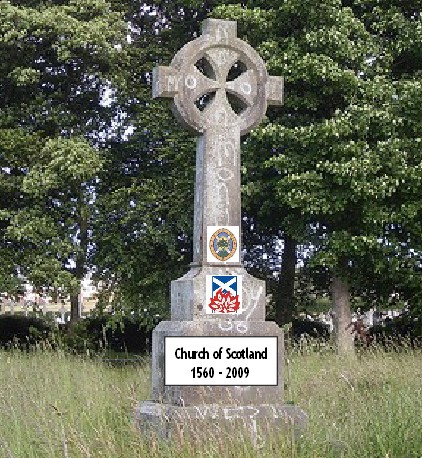The Church of Scotland: 1560 - 2009
In a dramatic climax to an issue that has been rumbling for 50 years, the General Assembly of the Church of Scotland has finally surrendered on the key issue of installing an openly gay minister.
by Watchman
Update (23 May 2011)
The Church of Scotland has voted in favour of allowing homosexual men and lesbians to serve as church ministers. Read on....
Update (21 May 2013)
The Church of Scotland has voted to allow actively-gay clergy to serve within the denomination. Read on....
Update (31 July 2014)
Rt. Rev. John Chalmers, the current Church of Scotland Moderator, "has told congregations not to insist on a belief in God for people wanting to join." Read on...
Update (16 May 2015)
The General Assembly of the Church of Scotland has voted to allow congregations to ordain gay ministers who are in same sex civil partnerships. Delegates voted 309 in favour and 183 against. A decision to allow gay minister to 'marry' is to be deferred to the 2016 Assembly. Read on....
LATEST UPDATE: (21 May 2016)
The General Assembly of the Church of Scotland has voted (339 to 215) to allow ministers to be in same-sex marriages. Read on.....
Ed footnote: The 'Latest Update' title under-states the significance of these most recent events. On this an other issues the Church of Scotland has demonstrated that, as Scotland's national church and largest denomination, has effectively jettisoned the Word of God as its doctrinal foundation.
first published 24/05/2009
 ON SATURDAY, 23 May 2009, Church of Scotland leaders – meeting in general assembly – voted to uphold a decision by an Aberdeen congregation to appoint a gay minister. ON SATURDAY, 23 May 2009, Church of Scotland leaders – meeting in general assembly – voted to uphold a decision by an Aberdeen congregation to appoint a gay minister.
After more than four hours of debate the annual gathering of the Kirk voted by 326 to 267 to support the call by the Queen’s Cross Church in Aberdeen to the Rev Scott Rennie who currently lives with his male partner.
In so doing, the Kirk has effectively turned its back on the traditional view of sexual relations as being confined to monogamous heterosexual marriage. And accordingly the institution has renounced its historic claim to be faithful to the Word of God as contained in both the Old and New Testaments.
The last crisis of this magnitude was in 1843 when a substantial minority of ministers, elders and members left the Church over the matter of state interference with church affairs and in defence of the right of local congregations to appoint their own ministers.
In a supreme irony, this is exactly what Queen’s Cross Church has now won the right to do.
A three-way split
The historical record of that 19th century schism often refers to the church being split in two. But in fact the division was a three-way affair. There were those who left, those who remained loyal to the establishment, and – as a third grouping – a substantial number who were in agreement with the secessionists, but who stayed in order to try and bring reform from within. And it is highly likely that the same dynamic will apply in coming days. Church leaders are fiercely loyal to the institution(s) within which they serve; and departure is not something that is taken at all lightly. But a gambling man would say that in any battle between the individual (or even a substantial group of individuals) and the establishment, the odds are stacked in favour of the great big machine; and there is no reason to think differently in this case.
|
..the lingering presence will be as ethereal as the vaporous smile on the face of the Cheshire cat. |
It will be interesting to see how Bible-faithful leaders respond to this seismic decision, but what is absolutely certain is that the Church of Scotland has lost all moral authority under God to continue to represent the Deity and the head of the universal church which is Jesus Christ.
Irrespective of the manner in which events will now unfold, there is absolutely no doubt that the structures will continue to exist and function. |
Even now plans will be in place for the next Church of Scotland General Assembly in 2010. But the lingering presence will be as ethereal as the vaporous smile on the face of the Cheshire cat.
Ichabod: the glory has departed
In a vision given to the prophet Ezekiel two thousand and five hundred years ago, the presence of God was seen to move from the Holy of Holies, to the temple threshold and then out to the city walls before disappearing from Jerusalem altogether (Ezekiel chs. 9 - 11). It was, as in Eli and Samuel's day, ‘Ichabod’ - the glory had departed from Israel (1 Sam. 4:21).
 While the form and structure will continue, it will be – as a brain-dead patient on a life support system – an illusion of life. And while some good men and women of God might continue to function within the Kirk endeavouring to reclaim the Biblical ground, their roles and operating environment will have changed. Any who do stay will essentially become missionaries in a dark and God-forsaken land. Amongst those who depart, like the mourners at a graveside, some will leave quickly whilst others will just slowly drift away. But the net effect will be cumulative and inevitable. While the form and structure will continue, it will be – as a brain-dead patient on a life support system – an illusion of life. And while some good men and women of God might continue to function within the Kirk endeavouring to reclaim the Biblical ground, their roles and operating environment will have changed. Any who do stay will essentially become missionaries in a dark and God-forsaken land. Amongst those who depart, like the mourners at a graveside, some will leave quickly whilst others will just slowly drift away. But the net effect will be cumulative and inevitable.
And what was begun in the Reformation upheavals of the 16th century when men of God fought valiantly to restore the Word of God as an absolute standard is now – at least as far as the Kirk is concerned – effectively reversed. Whilst other Bible-faithful denominations and groupings will continue to fight the good fight in Scotland, the spiritual welfare of the nation can no longer be entrusted to the Church of Scotland. The institution will survive, but in spiritual terms it must surely now be declared (almost) dead.
Only the Spirit of the living God can restore Scotland's national church (cf Ezek 37: 1-9).
Ed footnotes:
1. In the wake of this decision there could be an upsurge in the number of ministers who 'come out' as being gay, and they and others will now feel confident to officiate at civil partnership ceremonies.
Much prayer is needed if the Church is to continue to have any positive influence whatsoever on the spiritual well-being of the Scottish people and the nation.
2. A decision on an 'overture' (motion) to the Assembly from the Lochcarron-Skye Presbytery calling on the Church to affirm its traditional view on sexuality and ministerial appointments has been deferred until Monday (25 May). Whilst the debate around the motion will be of great interest, the stout wall of Biblical orthodoxy has been well and truly breached.
2. The Church of Scotland emerged out of the 16th Century Reformation. Just under one hundred years later it was officially constituted around the Westminster Confession of Faith (1646). The other main post-Reformation grouping adhered to the episcopalian system of having bishops, and became The Scottish Episcopal Church.
From the 17th century until the present day, the presbyterian church in Scotland has had a history of splits, schisms, secessions, re-unions and amalgamations. You can find a brief history here.
|